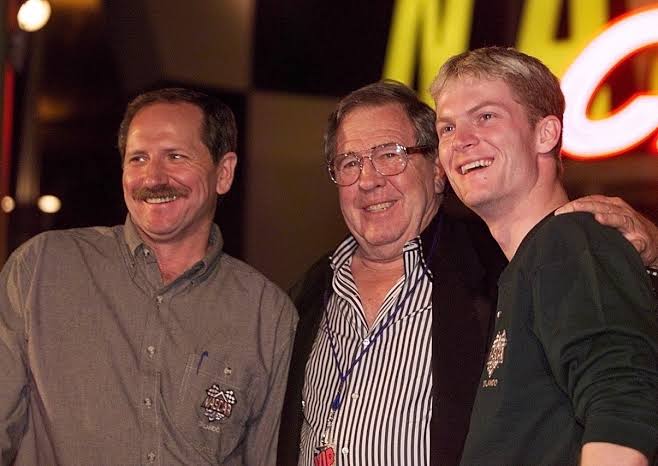
Imago
dale sr bill france jr

Imago
dale sr bill france jr
Jimmy Spencer’s sharp tongue hasn’t dulled with time. As the sport continues to evolve with changing sponsor dynamics, corporate priorities, and TV influence, Spencer’s no‑nonsense contrast between “then and now” lands with the kind of grit that once defined NASCAR’s personality.
Watch What’s Trending Now!
He’s not measured behind the microphone; his words, shaped by decades of firsthand experience, cut deep into how racing feels from the garage to the grandstands. The passion is raw, the critique unscripted, and the comparison to one towering name from the sport’s past hits hardest of all.
ADVERTISEMENT
For Jimmy the old man balanced the competition
When Jimmy Spencer recounted his memories of Bill France Sr., his voice reflected both reverence and frustration. He recalled a moment on the Door Bumper Clear podcast when Ford dominated the field, winning close to ten consecutive races with its Taurus program. France’s response, according to Spencer, showed why he was the architect of NASCAR’s competitive DNA.
“I remember the one time Ford was leap one hell like eight or nine, ten races with the Taurus,” Spencer said. “France called Earnhardt and me in, shut the door, and asked, ‘What’s going on?’… The following week, he gave the Chevys help. The one thing the old man knew was how to balance the competition.”
That story crystallized the grassroots leadership that defined France’s tenure. There wasn’t a committee or corporate department mediating parity; it was the founder himself who read the room, addressed rivalries, and acted decisively.
ADVERTISEMENT
Spencer went on to contrast that hands‑on oversight with the modern era. “You could go into the trailer, close the door, the old man would chew your a– out, or not,” he said. “I get that it’s a little more corporate today, but it’s a lot different.”
His comments drove home a sentiment rarely expressed from within today’s media circles. To Spencer, NASCAR’s contemporary decision-making feels distant, filtered through partnerships, PR sensitivities, and an endless pursuit of brand compatibility. It was never polished under France. It was principled, often brash, but unmistakably human.
ADVERTISEMENT
Tommy Baldwin, co‑host and longtime team owner, punctuated the segment by adding, “The only thing that is unbalanced in the competition now is money.” Spencer agreed without hesitation: “Yeah, that’s true.” The exchange painted a vivid picture. What France saw as a sporting obligation to give every manufacturer and driver a fighting chance has, in Spencer’s view, become an economic equation dictated by budget size and sponsor leverage.
That transformation, he implied, has drained much of NASCAR’s edge and unpredictability. Once, the show revolved around personalities and rivalries; now, it is data sheets and corporate commitments guiding race-day narratives. For a man who built his career on aggression, emotion, and risk, Spencer’s frustration was both nostalgic and prophetic.
Top Stories
Donald Trump Stuns Fans With Washington DC Street Race Tease Amid Ongoing Rumors
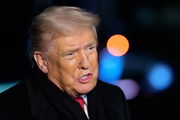
Kyle Petty Opens Old Wound as Kurt Busch’s Past Victory Revived Fallen Son’s Dream
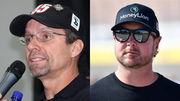
Proud Kyle Busch Declares His Family Name ‘Untouchable’ After Brother Kurt’s HoF Induction
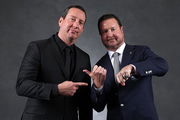
Bowman Gray Clash Under Threat as Winter Storm Forecast Derails NASCAR Schedule
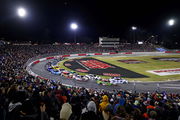
Jeff Burton Warns NASCAR There’s No Magic Fix After Admitting It Was Wrong
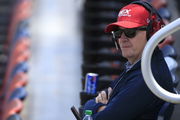
ADVERTISEMENT
NASCAR has lost much of the thrill
Jimmy Spencer, once nicknamed “Mr. Excitement,” believes NASCAR has lost much of the thrill that defined its golden era. The former Cup Series driver reflected on the sport’s past leadership and transformation, comparing Bill France Jr.’s firm but colorful management style with today’s more restrained approach. According to Spencer, the sport’s modern leadership has produced what he calls “boring drivers.”
Spencer recalled how Bill France handled fiery personalities and controversies in a way that fueled fan engagement instead of suppressing it. He shared an anecdote from his Busch Series days when France scolded him for criticizing officials, warning he’d be sent back to local tracks if he didn’t straighten up.
Another memory involved France’s response to Tony Stewart’s 2012 Bristol helmet-throwing incident. France jokingly reimbursed Stewart for the thrown helmet and encouraged the drama to continue.
ADVERTISEMENT
To Spencer, such leadership embodied passion, allowing rivalries to thrive while preserving the sport’s authenticity. By contrast, Spencer argued that NASCAR’s current focus on political correctness and image management has muted driver personalities. “They really did a lot to subdue the drivers,” he said, lamenting how racers today seem overly cautious both on and off the track.
His friend, former driver Kenny Wallace, echoed the sentiment years ago, saying that NASCAR drivers were no longer “water cooler talk” on Mondays like they once were. Points racing systems, which reward consistency over daring moves, have also contributed to a more calculated and less emotional style of competition.
As a result, Spencer believes NASCAR has lost the spark that made personalities like Dale Earnhardt, Tony Stewart, and himself household names. However, it’s not all bleak. Recent fan reactions hint that excitement can still return to the sport.
ADVERTISEMENT
Denny Hamlin’s win at Las Vegas, greeted with uncharacteristic cheers even from fans who once booed him, showed that passion and connection remain possible. For Spencer, such moments keep hope alive that NASCAR can recapture the energy of the Bill France era, a time when tempers, rivalries, and emotion made every race unforgettable.
ADVERTISEMENT
ADVERTISEMENT
ADVERTISEMENT
